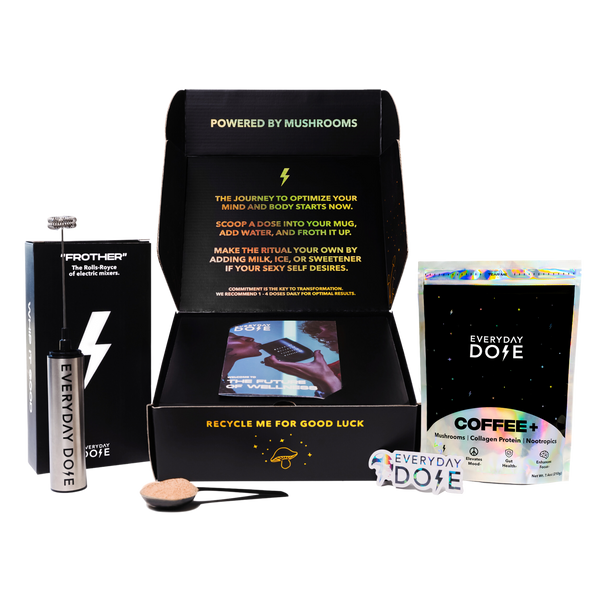Is Everyday Dose Organic? Unveiling The Truth Behind Organic Nutrition
Mar 21 2025
Organic nutrition has become a buzzword in the health and wellness industry, with more people questioning if their daily dietary choices truly align with organic standards. The term "is everyday dose organic" is a vital query that delves into the authenticity and purity of the food we consume daily. In an era where consumers are increasingly conscious about what they eat, understanding whether our daily intake is genuinely organic is crucial for long-term health and well-being. This article aims to demystify the complexities surrounding organic nutrition, providing evidence-based insights into what it means to have an organic daily dose.
With the growing popularity of organic products, consumers are often bombarded with conflicting information, making it challenging to discern fact from fiction. This inquiry into "is everyday dose organic" is not just about food labels; it’s about ensuring that the nutrients we consume daily contribute positively to our health. As we navigate through the labyrinth of organic certifications and marketing jargon, we’ll explore the real impact of organic food on our health and the environment. By the end of this article, you’ll have a clearer understanding of whether your daily dietary choices truly qualify as organic.
The importance of organic nutrition cannot be overstated. For those seeking to enhance their quality of life through dietary choices, knowing whether your everyday dose is organic is paramount. This article will guide you through the essentials of organic nutrition, highlighting key factors to consider when evaluating the organic status of your daily intake. Let’s delve into the world of organic nutrition and uncover the truth behind the everyday dose.
Read also:Post Malone And Donald Trump A Surprising Connection
What Does Organic Mean in the Context of Everyday Nutrition?
Understanding the term "organic" in the context of everyday nutrition is fundamental to answering the question, "is everyday dose organic?" Organic foods are produced without synthetic pesticides, genetically modified organisms (GMOs), or artificial additives. They are grown using natural fertilizers and traditional farming techniques that promote soil health and biodiversity. When we talk about an organic everyday dose, we’re referring to a diet that primarily consists of such foods, ensuring that the nutrients consumed are free from harmful chemicals and additives.
For many, the transition to an organic diet is driven by health concerns, environmental awareness, and a desire for cleaner eating. The benefits of organic nutrition extend beyond personal health, impacting the ecosystem positively by reducing pollution and conserving water. As we explore the nuances of organic nutrition, it’s essential to recognize the role it plays in promoting sustainable agriculture and enhancing food quality.
How Can You Determine If Your Everyday Dose is Organic?
Identifying whether your everyday dose is organic involves more than just reading food labels. It requires a deeper understanding of organic certification processes and the ability to differentiate between genuine organic products and those that merely claim to be so. Certifications from recognized bodies such as USDA Organic or EU Organic are reliable indicators of a product's organic status. However, it’s crucial to look beyond labels and consider the source of your food, its production methods, and the transparency of the supplier.
When evaluating if your everyday dose is organic, consider the following:
- Check for organic certifications on product packaging.
- Research the farming practices of your food suppliers.
- Opt for locally sourced, seasonal produce to ensure freshness and authenticity.
Is Everyday Dose Organic a Feasible Goal for the Average Consumer?
While the concept of an organic everyday dose is appealing, its feasibility varies depending on individual circumstances. Factors such as budget, access to organic products, and dietary preferences play a significant role in determining whether this goal is achievable. For some, incorporating a few organic items into their daily diet may be a practical starting point, while others may strive for a fully organic regimen.
Despite the challenges, the benefits of pursuing an organic everyday dose outweigh the obstacles. Improved health, reduced exposure to harmful chemicals, and support for sustainable farming practices are compelling reasons to embrace organic nutrition. By making informed choices and prioritizing organic options where possible, consumers can move closer to achieving an organic everyday dose.
Read also:Discover The Vibrant Charm Of Jersey City Nj A Complete Guide
Why Should You Care About Is Everyday Dose Organic?
The question, "is everyday dose organic," is more than just a dietary consideration; it’s a reflection of your commitment to personal health and environmental sustainability. Choosing organic foods can lead to better health outcomes, reduced risk of chronic diseases, and enhanced overall well-being. Moreover, supporting organic farming practices contributes to the preservation of natural resources and the promotion of biodiversity.
Is Everyday Dose Organic Worth the Extra Cost?
One of the most common concerns among consumers is the cost associated with organic products. While organic foods can be more expensive than their conventional counterparts, the long-term health benefits often justify the investment. Studies have shown that organic foods contain higher levels of essential nutrients and antioxidants, making them a worthwhile choice for those seeking optimal health.
What Are the Health Benefits of an Organic Everyday Dose?
Consuming an organic everyday dose offers numerous health benefits, including reduced exposure to harmful pesticides, improved immune function, and enhanced nutrient absorption. Organic foods are often richer in vitamins, minerals, and antioxidants, which contribute to better overall health. Additionally, organic diets have been linked to lower risks of heart disease, cancer, and other chronic conditions.
How Does the "Is Everyday Dose Organic" Trend Impact the Market?
The growing interest in "is everyday dose organic" has significantly influenced the organic food market. As more consumers seek organic options, suppliers are responding by expanding their product lines and improving accessibility. This trend has also led to increased transparency in labeling and certification processes, empowering consumers to make more informed choices. The demand for organic products is reshaping the food industry, encouraging more sustainable and ethical practices.
Can You Achieve an Organic Everyday Dose on a Budget?
While organic foods can be pricier, it’s possible to achieve an organic everyday dose without breaking the bank. Strategies such as buying in bulk, choosing seasonal produce, and prioritizing essential organic items can help manage costs effectively. Additionally, growing your own fruits and vegetables or joining community-supported agriculture (CSA) programs can provide affordable access to organic produce.
Conclusion: Is Everyday Dose Organic the Right Choice for You?
In conclusion, the question, "is everyday dose organic," invites us to reflect on our dietary choices and their impact on our health and the environment. While achieving a fully organic everyday dose may not be feasible for everyone, incorporating more organic foods into your diet can lead to significant health benefits and support sustainable agriculture. By making informed decisions and prioritizing organic options where possible, you can take meaningful steps toward a healthier, more sustainable lifestyle.
Is Everyday Dose Organic a Growing Trend?
Yes, the trend toward organic nutrition continues to grow as consumers become more aware of the benefits of organic foods. This shift is driven by increased access to information, improved availability of organic products, and a growing emphasis on health and sustainability. As the demand for organic foods rises, the market is evolving to meet consumer needs, making it easier than ever to incorporate organic options into your everyday diet.
Is Everyday Dose Organic the Future of Nutrition?
With the increasing focus on health, sustainability, and environmental responsibility, organic nutrition is poised to play a pivotal role in shaping the future of food. As more people embrace the concept of "is everyday dose organic," the food industry is likely to see significant changes, including greater emphasis on transparency, ethical farming practices, and consumer education. By choosing organic, we contribute to a healthier planet and a better future for generations to come.
Table of Contents
- What Does Organic Mean in the Context of Everyday Nutrition?
- How Can You Determine If Your Everyday Dose is Organic?
- Is Everyday Dose Organic a Feasible Goal for the Average Consumer?
- Why Should You Care About Is Everyday Dose Organic?
- Is Everyday Dose Organic Worth the Extra Cost?
- What Are the Health Benefits of an Organic Everyday Dose?
- How Does the "Is Everyday Dose Organic" Trend Impact the Market?
- Can You Achieve an Organic Everyday Dose on a Budget?
- Is Everyday Dose Organic a Growing Trend?
- Is Everyday Dose Organic the Future of Nutrition?

